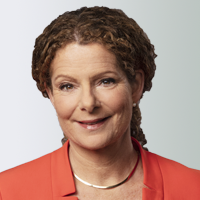Impartial media is necessary to avoid parallel realities
26 November 2020
In an article in Expressen, Swedish Radio CEO Cilla Benkö and Programme Director Björn Löfdahl write about the importance of impartial media in light of the polarised debate we have seen in the US in recent times, and in connection with the recent US election.
The media coverage of the election in the USA shows that impartial news media play a crucial role in ensuring that people receive the news reporting they need to be able to form their own opinion. Unfortunately, the development is going in the opposite direction, which risks creating parallel images of reality.
The aftermath of the US election is in full swing. One of the key issues being discussed concerns the shift that has taken place regarding the impartiality of the media. The United States today is, in many ways, a more polarised country than ever, and unfortunately that also applies to the American media. A discussion that has become highly topical over the past week is about how during the last terms of office the increasingly politicised US media have contributed to driving the population further apart. The more polarised American society has become, the clearer the political starting point is for media, such as Fox News on the one hand, and MSNBC on the other. In many cases, newspapers have also taken a clear stand in this election and are accused of pushing political ideas on their news sites.
According to the Reuters Institute’s Digital News Report 2020, as many as 30 percent of the Americans surveyed today prefer to take part of their news from sources that agree with their own opinions.
The fact that opinions sell, and that articles and reports that clearly take a stand are widely disseminated on social media, has played a role in this development and attracted more commercial media to position themselves. This is not least after the economic difficulties the media has undergone in recent years, which have further worsened during the pandemic. In the spring of 2020, as many as 36,000 American journalists lost their jobs.
At the same time, the media landscape in the United States has no equivalent to the strong and independent public service media that exists in Sweden and in several parts of the world today. Media that contributes impartial news and credible content that reaches a large, broad audience, and where many different voices and opinions are heard. Media that is available to everyone regardless of income or background.
Research clearly shows that strong and independent public service media benefit democracy through a wider range of news and public interest journalism, and by encouraging citizens to engage more in politics and society at large.
In Sweden, in contrast to some erroneous statements in the debate, there is strong support for public service media among the population. Confidence in Swedish Radio and Swedish Television is top among the Swedish media and has been stable throughout the 2000s. This support further increased during the pandemic *.
We can also state that many people chose Swedish Radio to help them understand how things were unfolding in the American election, both during the election day itself and afterwards. Swedish Radio’s listenership increased greatly, both in regular FM radio and on demand. Listening increased most among people under the age of 50 **. It is difficult to interpret in any other way than that many people turn to Swedish Radio to get a balanced picture.
There are worrying signs that an increasingly politicised media market is spreading. More and more news media in their reporting, and not just in leadership positions, speak to completely different groups, which in turn gives completely different images of reality in more and more countries. In the UK, for example, there are many indications that two new TV channels with a clear political agenda will be launched in the coming year, and even in Sweden there are voices that would like to see a more clearly politically coloured media landscape.
Of course, there may be room for media with a clear focus and political agenda for their reporting, but the emergence of this type of offer must not take place at the expense of the strong, impartial news coverage from companies that are not influenced by other agendas on their news sites. Such a development in Sweden would be deeply unfortunate.
Few probably want coverage before upcoming elections to be like what we have now seen in the USA.
In Sweden, we should insist on the idea that the citizens and our democratic society benefit from hearing of a common reality, in common news media, where we hear and share the opinions of others, even if we do not agree with them. In Sweden, it must continue to be a right that we can all form our own opinions about reality, and about what we want from the future.
In Sweden, the existence of strong, broad, independent and impartial media should be as natural a principle as the principle of journalism not being to tell people what to think.
* Confidence in Swedish Radio has increased during the corona pandemic
** Large increase in listening during the US election
Thanks to the Public Media Alliance for the translation




